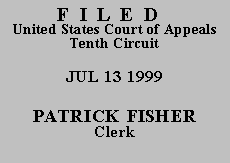

| THOMAS M. LEWTER,
v.
ATTORNEY GENERAL OF THE
STATE OF OKLAHOMA GARY CARDINALE; OKLAHOMA DEPARTMENT OF CORRECTIONS, Respondents-Appellees. |
No. 98-6182
(D.C. No. 97-CV-535) |
In this 28 U.S.C. § 2254 state habeas corpus action, Thomas M. Lewter asserts two claims for relief: First, he claims that the government presented insufficient evidence to convict him of conspiracy to traffic a controlled dangerous substance after former conviction of two or more felonies (Count I). Second, Mr. Lewter claims that the Oklahoma Court of Criminal Appeals erred by refusing to reduce his sentence for two counts of trafficking in illegal drugs (Counts V and VIII).(1) The magistrate judge recommended that Mr. Lewter's petition be denied on the merits. The district court adopted the magistrate's Report and Recommendation, denied the petition, and declined to grant Mr. Lewter a certificate of appealability. A habeas petitioner is entitled to a certificate of appealability only if the petitioner has made a "substantial showing of the denial of a constitutional right." 28 U.S.C. § 2253(c)(2). For the following reasons, we deny Mr. Lewter's request for a certificate of appealability and dismiss the appeal.
Mr. Lewter was charged with numerous counts of criminal activity after prior conviction of two felonies. The jury convicted him on several counts including Count I, a conspiracy which allegedly lasted from January 1 to April 7, 1989, and Counts V and VIII which stemmed from methamphetamine sales on February 23 and March 8, 1989, respectively. The jury acquitted him of two charges arising from the criminal activity of a co-conspirator in late March of 1989. Mr. Lewter had been convicted of one felony prior to January 1989; another felony conviction (unrelated to this case) became final on March 10, 1989.
The Oklahoma Court of Criminal Appeals upheld Mr. Lewter's conviction and sentence on Count I, and his sentence for Counts V and VIII. In affirming Count I, it noted that the conspiracy lasted through early April, by which time Mr. Lewter had been convicted of two felonies. It found that Mr. Lewter had only been convicted of one felony when he committed Counts V and VIII, but declined to modify his twenty-year sentence for each count as they "are in the range of punishment provided for by law" without enhancement. Aplt. App. at 11.
With respect to Counts V and VIII, "if a state appellate court has authority to exercise its own discretion and to modify a jury sentence on appeal as a matter of state law, no due process violations occurs" when it does so. Carbray v. Champion, 905 F.2d 314, 318 (10th Cir. 1990) (citing Clemmons v. Mississippi, 494 U.S. 738 (1990)). The Oklahoma Court of Criminal Appeals has such authority, see Livingston v. State, 795 P.2d 1055, 1058-59 (Okla. Crim. App. 1990), and in its discretion declined to reduce Mr. Lewter's sentence as it was in the permissible range for Counts V and VIII as modified. See Beaird v. Cody, No. 95-6061, 1995 WL 422855 at *1-*2 (10th Cir. July 19, 1995) (unpublished). Mr. Lewter has thus failed to make a substantial showing of the denial of a constitutional right and we therefore decline to grant a certificate of appealability on this issue.
Mr. Lewter also claims that the government presented insufficient evidence to convict him of Count I, conspiracy after former conviction of two felonies. Specifically, he argues that the state was obligated to prove he participated in the conspiracy after March 10, 1989, the date of his second felony conviction. He claims the government presented no such evidence, pointing to the jury's decision to acquit him of the two charges arising from conduct occurring from late March 1989 to buttress this proposition. He argues that the state therefore violated his constitutional right to be convicted only upon proof beyond a reasonable doubt.
"[T]he Due Process Clause protects the accused against conviction except upon proof beyond a reasonable doubt of every fact necessary to constitute the crime with which he is charged." In re Winship, 397 U.S. 358, 364 (1970)). After reviewing the record, the Oklahoma Court of Criminal Appeals held that because the conspiracy continued to April 7, 1989, the felony conviction that became final on March 10, 1989, was sufficient to enhance the conspiracy. Without the state court trial record, which is not in our record on appeal, we are unable to evaluate whether the evidence is sufficient on this issue to meet the due process standard. It is petitioner's burden, through counsel, to submit an adequate record on appeal. See 10th Cir. Rule 10.1(A)(1)(a) ("When sufficiency of the evidence is raised, the entire relevant trial transcript must be provided."). Consequently, we deny a certificate of appealability on this issue as well.
In conclusion, we DENY the certificate of appealability and DISMISS the appeal.
ENTERED FOR THE COURT
Stephanie K. Seymour
Chief Judge
*.This order and judgment is not binding precedent, except under the doctrines of law of the case, res judicata, or collateral estoppel. The court generally disfavors the citation of orders and judgments; nevertheless, an order and judgment may be cited under the terms and conditions of 10th Cir. R. 36.3.
1. Mr. Lewter originally appealed the district court's disposition of Count II, but then corrected his brief. To the extent Mr. Lewter intends to appeal the Oklahoma Court of Criminal Appeals' disposition of any count other than Counts I, V, and VIII, we do not consider the appeal as Mr. Lewter failed to raise the issues below. See United States v. Killingsworth, 117 F.3d 1159, 1162 n.2 (10th Cir. 1997).